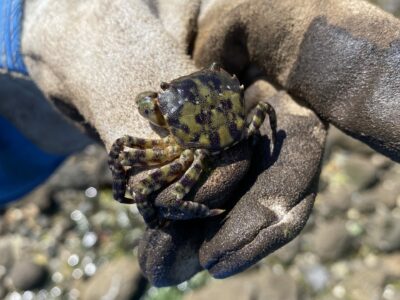Content warning: some content contained within this article, depict images of marine life, or key facts regarding pollution and human health which some readers may find distressing and reader discretion is encouraged.

By Akalya Sarathy, Impact Team Volunteer, & Vanessa Shambrook, Impact Team Leader
Plastic waste is choking our planet – polluting the air, water and soils that people, wildlife and plants need to survive. The rapid growth of plastic production has reached alarming levels, causing harm to our planet’s ecosystems and contributing to rising levels of global warming. This also poses a significant threat to human health and wellbeing.
Every year, an estimated 8 million metric tons of plastic waste finds its way into the ocean globally, equivalent to dumping a garbage truck full of plastic into the water every minute
This collective flood of plastic waste comes from a range of sources such as inadequate waste management systems, littering and industrial activities.
Plastics affect human and wildlife health through ingestion, entanglement, transportation of invasive marine species harmful to local species, and transportation of harmful “forever chemicals” – known as ‘PFAS’. More than 13,000 chemicals are associated with plastic and plastic production. Of these, 3,200 are of potential concern to human and environmental health.
Researchers have discovered that humans are ingesting microplastics (classified as pieces of plastic smaller than 5 mm in diameter) and nanoplastics (1nm – 1µm) through eating, drinking and breathing. Recent studies have shown that plastic particles can end up in the human bloodstream, brain and in the placentas of unborn babies.

Marine creatures, from the smallest plankton to great southern whales, can accidentally eat plastic while filter-feeding during which they extract small pieces of food and particles from the water. Ingestion of plastic can cause internal injuries, starvation and even death of marine life. Vital flora, such as coral reefs also suffer as plastic debris suffocates and harms these delicate ecosystems.
The solutions to keep plastic out of our oceans and reduce climate impact already exist. The Port Phillip EcoCentre is working hard to push for these solutions to be implemented across our Bay and globally.
These will help us reimagine how we source, design, dispose of, and reuse products.
Our work has included several Australian federal and one global submission on the impacts of plastic production and waste on human and fauna health. You can read our most recent submissions here.
We have asked for a holistic approach to ending plastic pollution including:
1. Australian laws which make the United Nations Plastic Treaty legally binding once the Treaty is finalised by world leaders.
2. Increased government regulation to support a circular economy that focuses on reducing production of virgin (new) plastic and phasing out/banning problematic plastics.
3. National funding to create community engagement partnerships and an authority to regulate plastics to take enforcement actions, that must apply protection to all Australian waters and landscapes.
4. Set legal definitions and mandatory verification schemes for degradability labels, including recycled and banning the term “recycled ocean plastic” – a new term which has no definition and is confusing for customers.
However, we cannot achieve a plastic-free environment without your support today.
What you can do today to end plastic pollution in our Bay
While celebrating Plastic Free July, we support a plastic-free Bay 365 days a year. For those you who are new to the plastic-free movement, it can be hard to know where to start. Here are five tips to change everyday habits and be on our way to a plastic free Bay.
1. Avoid unnecessary plastic that is used just once. Is there a package-free option? For example, pour from the soy sauce on the sushi counter, say ‘no thank you’ to soy fish (we find these in every litter clean up).
2. Choose reusables! Sit down for your coffee in a mug, or bring a keep cup. Increasingly shops and cafes support BYO containers for food, bulk oils and grains, or body products.
3. Repair your wardrobe at our Repair Cafe, refresh your style with a clothes swap, or buy second-hand, and when you replace outfits choose options made of natural fibres such as hemp, linen, seaweed, and organic cotton. (Modern clothing is often plastic, which lasts forever yet is discarded quickly.)
4. Become familiar with product labels. Always choose reusable and package-free options over ‘recycled’ ‘biodegradable’ or ‘compostable’ plastic products:
5. Products that are marketed as sustainable are often just as damaging to the environment as regular plastic products. Biodegradable bags still release greenhouse gases when in landfill, and compostable products only break down in specific composting facilities, of which very few exist in Australia.
Alternatives to plastic are not legally required to meet any standards. They’re often unclear about the duration or technology required to break down over time, or whether your local council has the facilities to process industrially compostable products.
Production of recycled plastic products often results in microplastics being released into the environment during industrial processes.
Be a plastic detective for a week: check your bins, or take phone photos as you shop to count up what plastics are sneaking into your world (often without us asking). There are no failures, only learnings! Now that you know your top three plastic items, spend a month tackling them: say ‘no thank you’, swap for reusables, or chat with a brand or business to change.
We’re fighting for a plastic-free Bay, and everything works better when we tackle it together. Will you join us? Sign up for our next Volunteer Induction Session on 3 August 2023.


